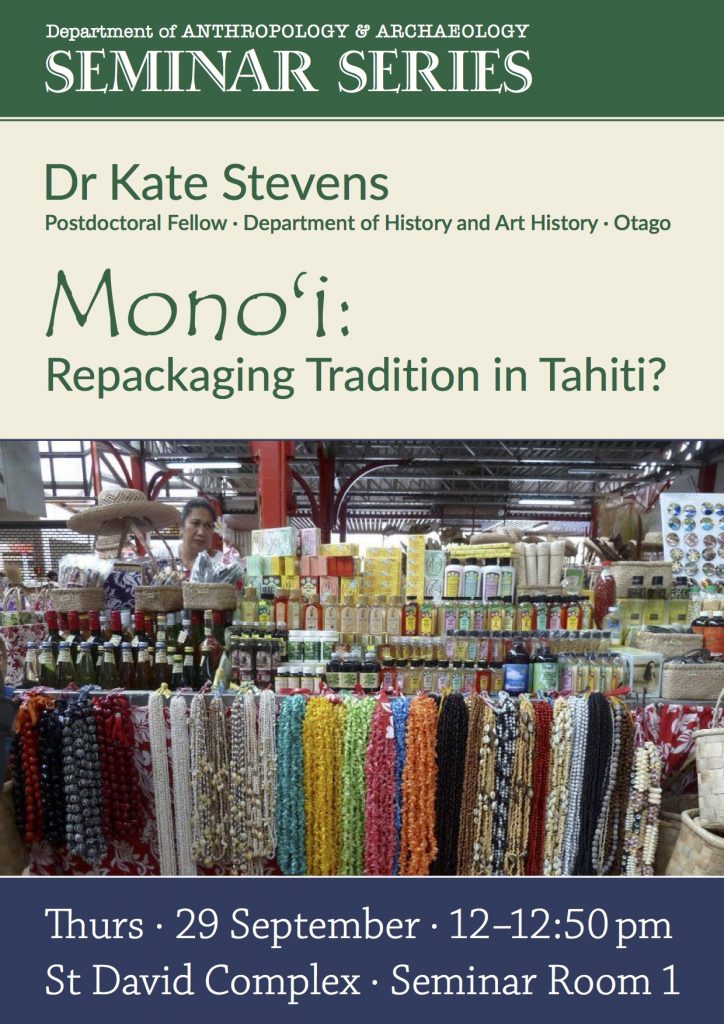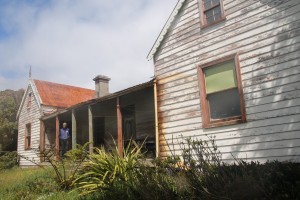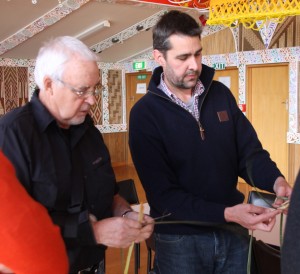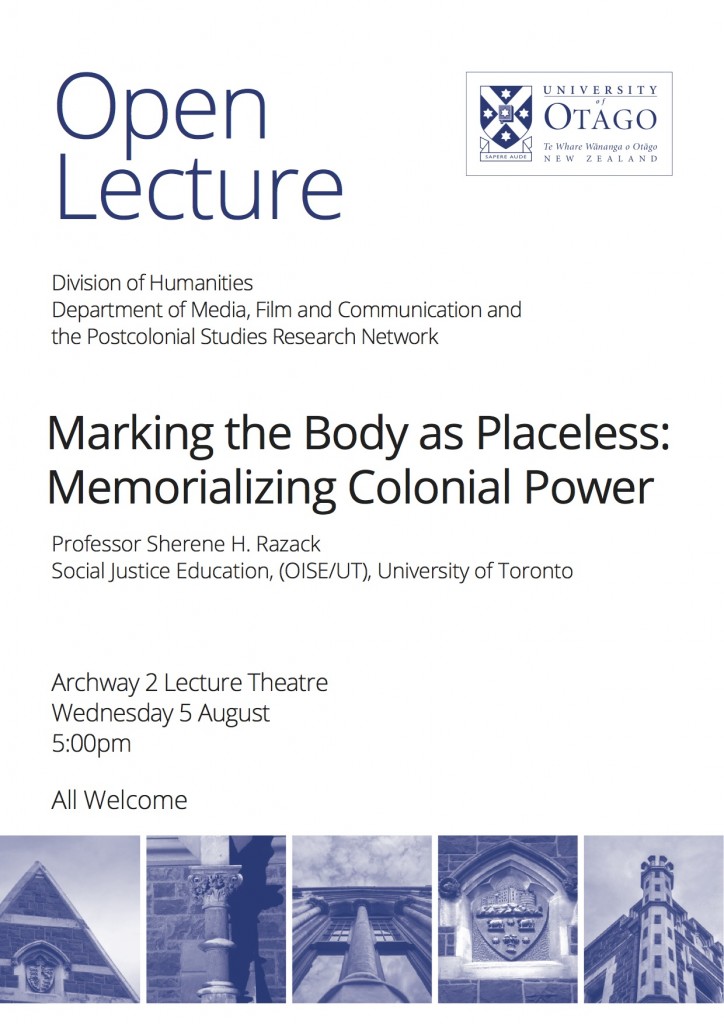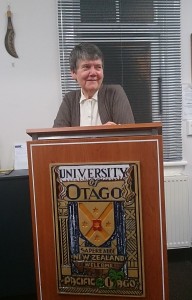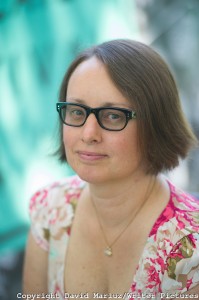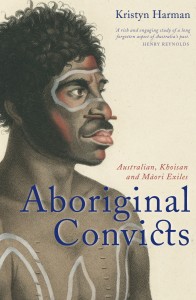Research Seminar on Mono’i
We are pleased to announce that Centre member Dr. Kate Stevens will present a research seminar on Thursday 29th September in the University of Otago’s Department of Anthropology and Archaeology Seminar Series. Kate will talk on “Mono’i: Repackaging Tradition in Tahiti?”. Her seminar begins at 12pm, and will take place in Seminar Room 1, St David’s Complex. Hope to see you there!
Colonialism, Archives and Mental Health
In February 2016 Associate Professor Sally Swartz, a clinical psychologist and psychotherapist who publishes regularly on psychoanalytic theory and psychotherapy, and the history of psychiatry in colonial settings, will be visiting the University of Otago with the support of the Centre for Research on Colonial Culture. Her 2015 book, from the University of Cape Town Press, is entitled Homeless Wanderers: Movement and mental illness in the Cape colony in the nineteenth century. In addition to attending the Making Women Visible Conference (15-17 February), Associate Professor Swartz will offer two talks, both open to the public.
On February 18 she will offer the following presentations:
1) A session on ‘The Archive and the Person: History and Psychotherapy’ reflecting how being a practitioner works alongside being an historian.
2) An open lecture entitled ‘Families, Emotion and Attachment: Insights from the past to the Present’ .
Times and places to be arranged.
For further information please contact Professor Barbara Brookes (barbara.brookes@otago.ac.nz)
He haerenga ki Awarua
On Thursday 29th, CROCC member Michael Stevens hosted a number of fellow members, and other guests at his home marae, Te Rau Aroha, at Bluff, to look at Māori/maritime history and how this aligns with Michael’s Marsden-funded project, A World History of Bluff.
As well as visiting a number of the locales that inform Michael’s work, we were also able to give short presentations to local people at the marae on the Thursday evening. These included: Atholl Anderson (Retired, ANU): “Archaeology in the Southern Margins”; David Haines (Waitangi Tribunal): “Tuhawaiki’s Cannon”; Tony Ballantyne (Otago): “An Indian Sailor in the South”; Jonathan West (OTS): “A triangulated moment in the Tasman Triangle: Port Pegasus, 1826”; Angela Wanhalla (Otago): “‘Granny Harrold’: The Transnational Life of an Indigenous Woman”; Lachy Paterson (Otago): “Southern Kāi Tahu and Māori-language newspapers”; and Jane McCabe (Otago): “Kalimpong Kids in Southland”. Regular draws also saw a number of books given to attendees.
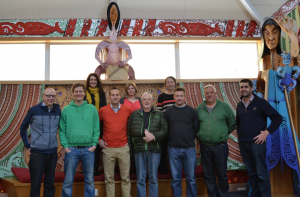
From left: Tony Ballantyne, David Haines, Frances Steel, Ryan Jones, Angela Wanhalla, Atholl Anderson, Jane McCabe, Jonathan West, Lachy Paterson, Michael Stevens.
There were several highlights. Serendipitously Sir Tīpene O’Regan, the upoko of the local Awarua Rūnaka was in town, and kept us entertained with stories on the Friday night. And on Saturday we were lucky to visit Stewart Island and visit several historical spots, including the “Travellers Rest”, a boarding house run by a Agnes Harrold, a nineteenth-century Metis woman from Manitoba. A big thank you to Michael and his whānau for their hospitality, and the ringa wera at the marae who kept us so well well fed while we were there.
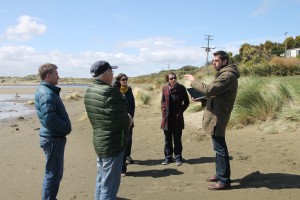
Trying to keep warm at Omaui Beach. Not only a site of shipwreck, but of the long and continuing presence of a number of Kāi Tahu whānau.
Visiting Scholar
Associate Professor Tamara Loos (Cornell University, New York) is visiting the University of Otago this week. While here she will give a public lecture on Tuesday 4th August on the topic of Biography and Islam in Thai history. This talk will tae place at 5pm in the Quad 1 lecture theatre, and all are welcome. Click here for further information about this talk. While in Dunedin Associate Professor Loos will give a research seminar in the Department of History and Art History Seminar Room (second floor Arts Building, room N8), beginning at noon on Wednesday 5th August. Her talk will will explore the social history of nineteenth and early twentieth century Siam through the lens of a prince, reluctantly drawn into rebellion. Please come along!
Colonial Attritions: State Violence and Social Forgetting
Centre member Associate Professor Annabel Cooper is presenting at the Colonial Attritions: State Violence and Social Forgetting research symposium next week. She will speak on her current research, which is concerned with how the New Zealand Wars are publicly remembered, particularly through film. The research symposium will take place on Wednesday 5th August in Seminar Room 3, Central Library. All are welcome. Registration is $5 for students/unwaged and $10 for academics/waged, payable by cash on the day. You can find out more about the symposium, the programme of speakers, and read their abstracts in the Colonial Attritions booklet (attached). A public lecture by Professor Sherene Razack (University of Toronto) complete’s the days proceedings. This is a free lecture and all are welcome to attend.
Oceanian Journeys and Sojourns
An exciting new book, Oceanian Journeys and Sojourns: Home thoughts abroad, edited by Centre member, Professor Judy Bennett, was launched last night.
A good crowd squeezed into the Pacific Islands Centre at the University of Otago to attend this launch. Assoc Prof Jenny Bryant-Tokalau (Te Tumu) introduced the book, which “focuses on how Pacific Island peoples – Oceanians – think about a range of journeys near and far: their meanings, motives and implications.” The book, published by Otago University Press, is notable for having mostly authors who are Pacific Islanders, including a number of women.
James Cowan Research now published.
“Born to a soldier-settler family at the end of a decade of colonial conflict, James Cowan grew up on the site of the Battle of Ōrākau. In the anxious years after the Waikato War, he learned the language and the stories of people on both sides. He went on to become a journalist and a historian of colonial New Zealand, and perhaps the most widely-read interpreter between Māori and Pākehā cultures in the first half of the twentieth century.”
In February 2014 a successful one-day conference on James Cowan and his impact was held at the Alexander Turnbull Library, jointly organized by Associate Professor Annabel Cooper from CROCC and Ariana Tikao, Research Librarian Māori at the Turnbull. Research from the conference has now been published (freely available online) in a special issue of the Journal of New Zealand Studies, “James Cowan and the Legacies of Late Colonial Culture in Aotearoa New Zealand”.
Visiting Fellow
This week the Centre for Research on Colonial Culture welcomes Dr. Kristyn Harman (University of Tasmania) as a visiting research fellow to the centre. Kristyn lectures in Aboriginal Studies and has published widely on Aboriginal history, race relations, warfare, and colonialism in significant international journals like Journal of Colonialism and Colonial History and the Journal of Imperial and Commonwealth History. Her first book, Aboriginal Convicts: Australian, Khoisan, and Maori Exiles (UNSW Press, 2012) was awarded the prestigious Kay Daniels prize in 2014 by the Australian Historical Association. Kristyn is visiting for two weeks, where she will be based in an office in the Department of History and Art History and during her time here will present her research at a CRoCC symposium on Indigenous mobilities in history, as well as discuss a new project on PoWs at Featherston during WWII at the Migrant Cross-Cultural Encounters conference (24-26 November).
Forthcoming Conference
Migrant Cross-Cultural Encounters: A Multidisciplinary Conference
24-26 November 2014
University of Otago, Dunedin, New Zealand
Historical and contemporary global migration involves a range of cross-cultural encounters, but how are these interactions discussed, debated, and defined? This three-day multidisciplinary conference seeks to examine past and present migrant encounters with other peoples in a diverse range of locations. Papers from various disciplinary angles are welcome from a variety of themes and from any historical period or region.
Themes may include but are not limited to:
- Race, ethnicity and citizenship
- War, migration and cross-cultural contact
- Labour, migration and cross-cultural encounters
- Empire, contact and mobility
- Gender, migration, and cross-cultural encounters
Please provide:
- a title
- a 250-word abstract of your paper
- brief biographical information (including institutional affiliation and contact details).
All proposals will be assessed after the deadline of Friday 11 July 2014. If you require an earlier acceptance please advise us.
Proposals or requests for further information should be sent to: migrants@otago.ac.nz
The conference is sponsored by four key multidisciplinary research hubs in the Division of Humanities at the University of Otago:
- Centre for Irish and Scottish Studies
- Centre for Research on Colonial Culture
- Asian Migrations Research Theme
- Comparative and Cross-Cultural Studies Research Theme
For further information see the website (click the highlighted text).
“Objects book” progress
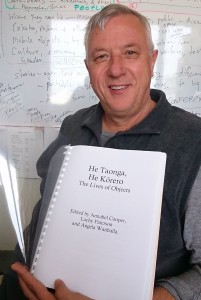
Manuscript ready for sending to Conal.
In February 2013 CROCC held its inaugural conference on “colonial objects”. This was a successful event attracting academics, librarians, archivists, heritage professionals, and others. It was always our intention to publish a collection of essays coming out of the conference presentations. The editors, Annabel Cooper, Lachy Paterson and Angela Wanhalla still have some loose ends to tie up (ably assisted by their RA, Katie Cooper) but are happy to report that our draft is almost ready. It has now been sent to Conal McCarthy at VUW to read and add a final reflective essay. Then it will be off to Otago University Press to perform their magic. Expect it in the bookshops in 2015. A big thank you to all involved.

